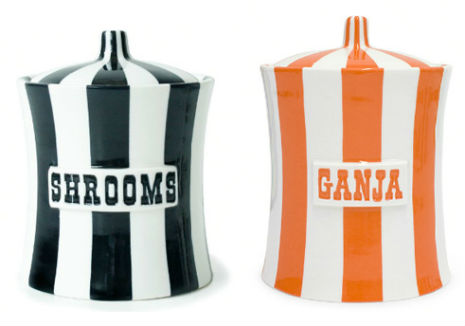

“Vices Canisters” by Jonathan Adler boasts your drug of choice with its old school drug name proudly displayed on the front.
The pottery ranges anywhere from $28.00 for a small canister to $138.00 for a larger one.
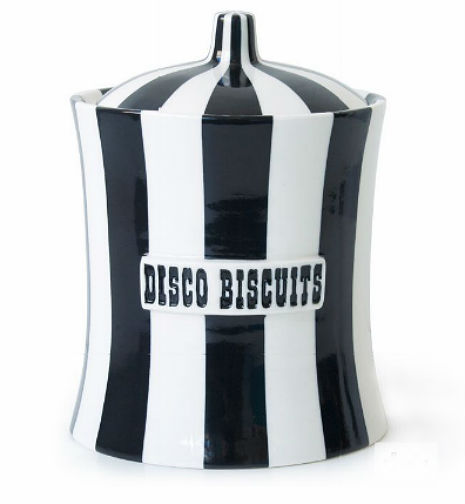
Via Who Killed Bambi


“Vices Canisters” by Jonathan Adler boasts your drug of choice with its old school drug name proudly displayed on the front.
The pottery ranges anywhere from $28.00 for a small canister to $138.00 for a larger one.

Via Who Killed Bambi
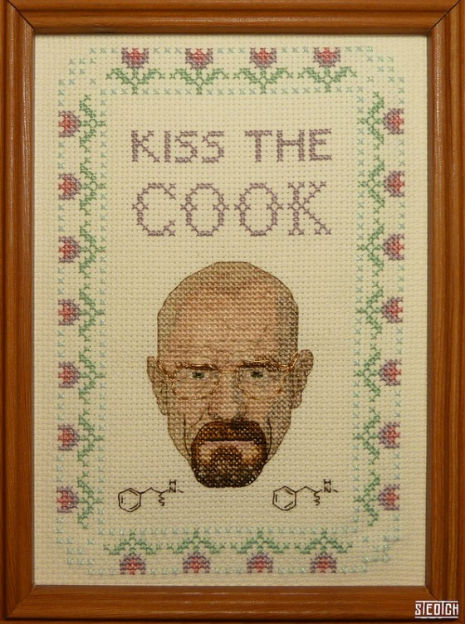
Kiss the Cook by STEOTCH
Here’s a superb chronological recap of series 1-4 of Breaking Bad set to Clint Mansell’s “Requiem for a Dream (Orchestral Version).”
The big “reveal” in the last 30 seconds of the season finale last year was one of the single most mind-bending moments of television, ever. If you’ve been trying to get your friends and family to watch the show, the above video is a great way to get them caught up before the season 5 premiere on July 15th.
Via High Definite

“YES WE CANNABIS!”
Bullshit, you gullible hippie… Dream on.
It must’ve been a particularly fucking slow day yesterday at The Atlantic Wire: how else to explain the popular, much-shared, but curiously devoid of any real news, or worthwhile analysis post with the winning link bait headline: “Is Legalizing Weed Obama’s Secret Weapon?”
(Apologies for my own ironic posing of that same question in the title here. Yes I wanted to draw you in, but at least I’m honest enough put quotation marks around it!)
Elspeth Reeve writes:
In 2004 George W. Bush’s re-election campaign worked to put anti-gay marriage ballot initiatives up for vote in several swing states in order to turn out more hard-core conservatives to the polls. This year the question is whether marijuana legalization measures will turn out young voters for Obama.
WHO is asking such a question? Certainly not many journalists with Google at their disposal, right?
But Reeve valiantly shoves on, nevertheless:
Bush’s plan to use gay marriage bans—in states that did not actually allow gay marriage—as a turnout booster led to signs featuring icky public restroom symbols proliferated and liberal panic that the Christian right had taken over. The press obsessed over “values voters.” One of Bush’s aides, Ken Mehlman, who later came out as gay himself, has apologized for the strategy, two others say it didn’t work.
This year there’s another incumbent president with modest approval ratings who could turn out his base with controversial ballot measures. But this time, the issue features no biblical or scatological imagery. In 2012, voters in swing states will decide whether they’ll allow their fellow citizens to bear joints. Unlike the gay marriage votes, there’s no indication that Obama’s re-election team is behind any of the pot legalization initiatives, but there are Democrats who are hoping that it will boost turnout among weed’s biggest fans: young people.
What?!?! These two things have nothing in common.
This risible nonsense was forwarded by several of my friends and acquaintances yesterday (you know who you are) with their apparent approval, as if all of a sudden Obama and Eric Holder were going to appear smoking blunts on the cover of October’s High Times magazine as they announce a cabinet level “herb czar” post for Woody Harrelson!
The Atlantic Wire post—it should have been obvious to anyone—was a steaming crock of liberal projection of the worst type… and dig the non-logical logic: In 2004, George Bush cynically used the prevailing winds at the time blowing against gay marriage to get himself re-elected. Now Obama can do the same by jumping on the pro-marijuana bandwagon.
What the fuck Atlantic Wire? Child, someone has lied to you.
The Obama administration’s actual real-life history on the medical cannabis front is in diametric opposition to promises made on the campaign trail in 2008 and broken ever since! This is all, of course, a matter of public record, but to be fair to Elspeth Reeve, Google was broken the other day, wasn’t it?
Or maybe she was high?
Today’s Huffington Post features the following headline: “Medical Marijuana Crackdown Leads Feds To Target Landlords Of Pot Businesses.”
In this article, the cynical way the Obama DOJ is going about “softly” dealing with the proliferation of medical cannabis dispensaries in California is laid bare (and it is EXACTLY what Bush’s DOJ was doing. The. Exact.Same.Thing.): The Feds are threatening the landlords who rent to the dispensaries under civil-forfeiture statutes that allow the government to seize real estate used to commit or facilitate drug trafficking. And this is cost effective for the Feds, too: Usually all they have to do is send a letter to the property owner, threaten to take their property away from them and there goes the problem in a puff of smoke.
Or at least this is generally how it works. Landlords with savvier legal advisers simply ignore such letters, while less clued-in building owners usually cave and kick the cannabis clubs to the curb:
Federal prosecutors are targeting medical marijuana shops in California, seeking forfeiture of the properties in which they do business.
The authorities are pressuring landlords to shut down the shops or face possible loss of the real estate through the unconventional and low-key use of a civil statute designed primarily to seize the assets of drug-trafficking organizations.
While some states, including California, have legalized medical marijuana businesses, the federal government does not recognize their authority to do so and has targeted the shops for violations of the 40-year-old Controlled Substances Act.
The goal of the Justice Department’s effort, part of a crackdown announced last October, is to fight the medical marijuana industry, estimated at $1.7 billion annually, without confronting it head-on with costly and potentially embarrassing criminal prosecutions, industry sources and legal experts said.
This indirect strategy is reminiscent of the department’s attempts, which have met with only limited success, to sever the medical pot industry’s access to banking services. Many businesses have found ways around those restrictions, experts said.
“Filing asset-forfeiture lawsuits against these commercial properties is a very clever way to handle an otherwise horribly difficult and controversial situation,” said Greg Baldwin, a partner at the Miami law firm Holland & Knight and a former federal prosecutor.
“If you bring criminal charges against these medical marijuana businesses, the federal government gets pilloried in the press for attacking California law and sick people.”
The idea that the Obama administration is going to all of a sudden turn on a dime and become pro-pot is a pipe-dream. Last week in Los Angeles the Feds brought asset-forfeiture lawsuits against several buildings housing marijuana stores and sent the so-called “warning letters” to dozens of property owners threatening similar legal action. The letters gave property owners just two weeks to comply. Although the odds of the Feds actually carrying through with the threat seem rather low, how would you feel if you owned rental property and you got a letter from the Feds like that? What if they are serious this time?
You see how that might wear on you. It’s not worth it, so bye-bye law-abiding, 100% legal as per the voters of the great state of California pot dispensaries. Even the dispensary owners who own the buildings they operate out of would have to have nerves of steel (and deep pockets) to stare down that kind of threat.
In the same way that I hate it when conservative know-nothings nod in idiot approval at fantasy and emotional projection onto “leaders,” it’s no less grating on the nerves when it is progressives who are the ones who are being the lazy, brainless idiots when they hero worship a guy who clearly doesn’t deserve it…
Below, Bill Maher, Mos Def, Salman Rushdie and Christopher Hitchens discuss what Obama actually said about marijuana legalization:
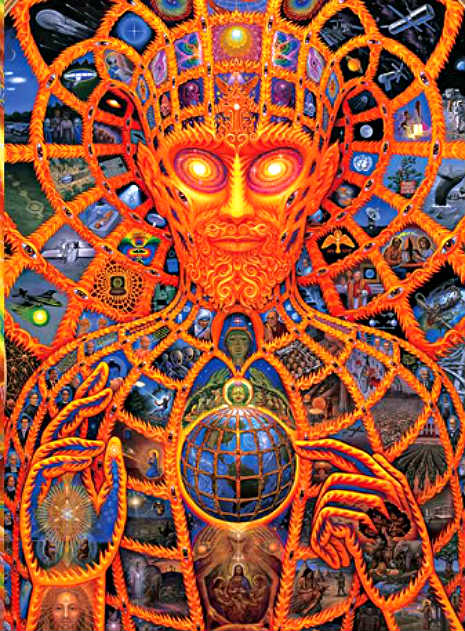
Manifesting The Mind is a terrific, thorough and insightful documentary that explores the benefits, suppression, shamanic uses and philosophy of psychedelics. It mostly consists of talking heads, but ah what heads they are.
Interviews include - Robert Bussinger, Mike Crowley, Timothy Freke, Peter Gandy, Alex Grey, Clark Heinrich, Nick Herbert, John Major Jenkins, Dennis McKenna, Terence McKenna, Daniel Pinchbeck, and Dr. Rick Strassman.
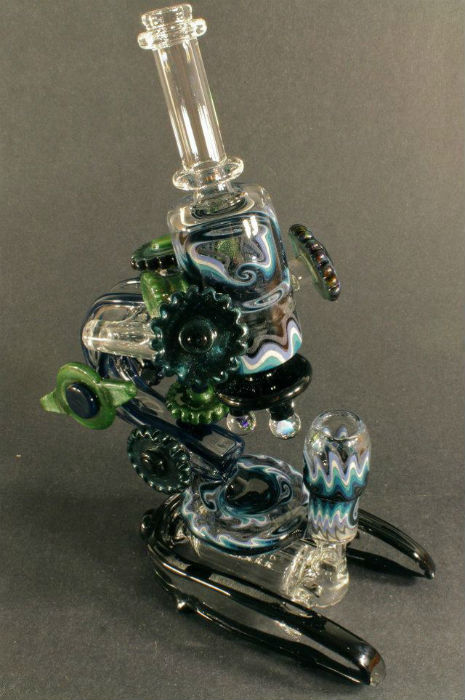
Intricate glass microscope marijuana pipe by Elbo Glass and Glass Munky made at Future Labs New England.
I think this must be a one-off prototype. Can you imagine how long this took to make?
Via Geekologie
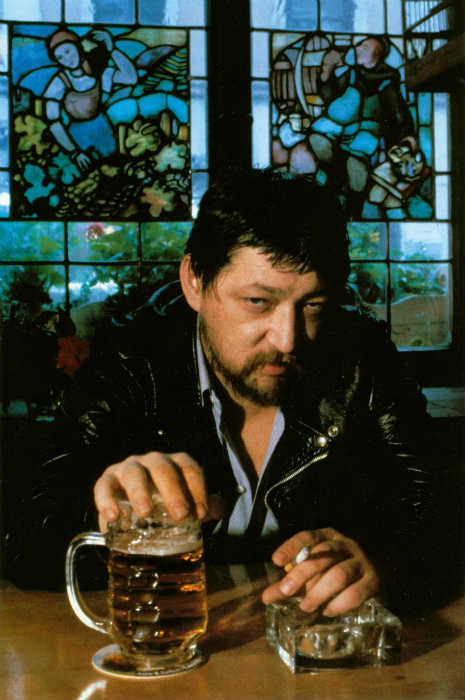
When she found him in the early hours of the morning, it seemed as if he was sleeping. Lying on the bed, with an ink-marked script beside him. Still dressed, his shoes carelessly kicked off, a television flickering in the corner. The room smelled of smoke and sweat. She noticed the table lamp was still on, his pack of cigarettes, an overfilled ashtray. It seemed as if he’d fallen asleep as he worked on his latest screenplay Rosa L., a film about the revolutionary socialist Rosa Luxemburg. He looked pale. An unlit cigarette drooped from his lips, a small trickle of blood glistened from one nostril. For four years, Juliane Lorenz had been his partner, she had seen him tired out like this before, falling asleep while working late at night, geed-up by cocaine and alcohol, but this time there was something different. Juliane listened. He was too quiet. When he slept he snored. But now, all she heard - the ticking clock, the television, the hush of traffic outside - was his silence. Rainer Werner Fassbinder was dead.
It’s still hard to believe Fassbinder managed to do so much in his short thirty-seven years of life. That fact he was working on a script at the moment he died, says everything about his dedication to his art. In less than fifteen years, Fassbinder made forty feature films, three short films; four TV series, twenty-four stage plays and four radio plays. He also acted in thirty-six productions and worked scriptwriter, cameraman, composer, designer, editor, producer and theater manager.
Born into a middle class family, his father was a doctor who worked near Munich’s red light district. His mother helped with her husband, and neither had much time for their son. After their divorce, Fassbinder lived with his mother, who worked as a translator but was often absent, hospitalized with tuberculosis. Then, Fassbinder spent his time with neighbors, listening to their life stories or, going on his own to the cinema - he later claimed he saw a film a day during his childhood.
“The cinema was the family life I never had at home.”
His favorite films were melodramas, his favorite director Douglas Sirk, of whom Fassbinder said:
“The important thing to learn from Douglas Sirk’s movies is that on the screen you are allowed to, or better still, supposed to, enlarge people’s ordinary feelings—as small as they may be—as much as possible.”
Fassbinder started writing plays, and read about the Spanish playwright Lope de Vega, who had over 1,800 plays attributed to him. This became the gold standard to which Fassbinder aimed his ambitions. At eighteen, he joined a theater group, and the first hint of his incredible talents and ambitions became apparent.
Within two months of joining the Action Theater group, he became its leader. This proved too much for other, older members, who led to the group’s disbandment. Fassbinder then created a new company and drew together a team, or family of actors - Peer Raben, Harry Baer, Kurt Raab, Hanna Schygulla and Irm Hermann - who were to work with him until his death.
His first movie was a “deconstruction of the gangster films”, called Love is Colder than Death, it caused considerable controversy at its premiere at the Berlin Film Festival in 1969, where Fassbinder was jeered and denounced as a “dilletante” by members of the audience. Even so, it established his reputation as a talent to watch, and led on to his next film, Katzelmacher, which was adapted from his stage play. It was the start of his movie career that saw such an unparalleled output. Everything in Fassbinder’s life went towards his film-making. He was often ruthless and allegedly pimped some of the theater group actresses to raise money for his films.
“I would like to build a house with my films. Some are the cellars, others the walls, still others the windows. But I hope in the end it will be a house.”
The turning point came in 1971 with the release of The Merchant of the Four Seasons, the tale of a merchant who is slowly destroyed by circumstances beyond his control. the story epitomized Fassbinder’s world view as tragedy. Life was battled out against insurmountable odds, at great cost to its players. Though his films were often described as “bleak”, I never found them less than engrossing, for the theme to all his films is love - the cost love has on us all.
During the 1970s and 1980s, Fassbinder made such unforgettable films as The Bitter Tears of Petra von Kant (1972) (adapted form his play); World on a Wire (1973); his first major international success Fear Eats the Soul (1974), the story of love between an older woman and Moroccan immigrant, played by Fassbinder’s then lover El Hadi ben Salem; Effi Briest (1974); Fox and His Friends (1975); Mother Küsters Goes to Heaven (1975); Despair, his first English film, with a script adapted by Tom Stoppard form the novel by Vladimir Nabokov; In a Year of Thirteen Moons (1978), Fassbinder’s bleakest and personal movie, made in response to the suicide of his lover, Armin Meier; The Marriage of Maria Braun (1978), which became a breakthrough movie in America; Berlin Alexanderplatz (1980), a 13-hour TV series adapted form Alfred Döblin’s novel; Lili Marleen (1981), another big budget English movie; Veronika Voss (1982) which was inspired by Billy Wilder’s Sunset Boulevard; and his last major feature, which progressed cinematic narrative in a new and original way, Querelle (1982), adapted form the novel by Jean Genet. Fassbinder had just finished editing Querelle when he died.
The official cause of his death was “an overdose of cocaine and sleeping pills”. The cost of his lifestyle and his ambition took too great a toll. Before he died, his body had bloated from an excess of drink, food and drugs, and he once said, he became fat to make it harder to be loved. Fassbinder used his body, as he used chain-smoking, or his excessive drinking, as means to protect and distance himself from others. His sense of being unloved or, of being unworthy of love, stemmed from the parental indifference of his childhood. When he was older, he often treated his lovers and those closest to him badly, testing their loyalty and love for him. Emotionally, Fassbinder was childlike, as he always searched for that imagined lack, which would make him feel loved. It was this, Fassbinder’s own emotional biography that underscored his films.
Thirty years after his death, we can more fully appreciate the scale and quality of Fassbinder’s genius; and see the real beauty of the man who was Rainer Werner Fassbinder.
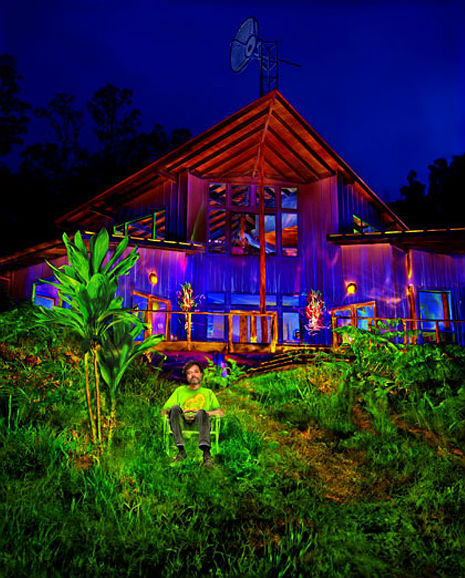
Terence McKenna at his house in Hawaii by Dean Chamberlain
Renowned science writer John Horgan, author of The End of Science, Rational Mysticism and several other books, pens a regular column at Scientific American where he takes a closer look at some of the quirkier topics that can still fall under the purview of “Science.” His current column pertains to Terence McKenna, the late psychedelic bard who spoke of the “self-transforming machine elves from hyperspace” he’d meet though psychedelic drug use.
What interests Horgan the most pertains to McKenna’s so-called Timewave Zero theory of history, which holds that something “novel” and mind-bending would happen on December 21, 2012. This notion was “revealed” to him by an “alien intelligence” during a psychedelic experiment conducted by McKenna and his younger brother Dennis, in the Amazon jungle in 1971 (Dennis McKenna, today a respected ethnopharmacologist, was the “channel” through which this entity supposedly spoke, has apparently never been much of a believer in his brother’s apocalyptic theories).
The Timewave Zero formula purports to mathematically “decode” the 64 hexagrams of the King Wen sequence of the I Ching into something that graphs fractal patterns of “novelty” and particularly active eras in history, culminating in a singularity point of infinite complexity that he predicted would happen at the end of the 13th b’ak’tun of the Maya calendar.
McKenna believed that all of human history and cultural and scientific evolution were moving inexorably towards a “strange attractor” at the end of time. Timewave Zero was later codified into a software program that seemingly mapped major moments in humanity’s evolution with the Timewave’s peaks and valleys.
McKenna’s theory, as written about at length in his books The Invisible Landscape and True Hallucinations, is a fascinating hermeneutic intellectual construction, and one that allowed for him to spin poetic and truly mind-bending thoughts about history, man’s place in the cosmos and of course, a sort of psychedelically-constructed apocalypticism that kept audiences absolutely spellbound, but rationally speaking, it’s wild-eyed, tied-dyed nonsense for soft-brained people…
John Horgan went to hear McKenna speak at a 1999 talk in Manhattan sponsored by the Open Center (I was in attendance at the talk myself, more on this below) and interviewed the psychedelic spokesman the following day. The object of Horgan’s line of inquiry was, not so surprisingly, to ask McKenna if he was actually serious about his 2012 predictions:
So what did McKenna really think would happen on December 21, 2012? “If you really understand what I’m saying,” he replied, “you would understand it can’t be said. It’s a prediction of an unpredictable event.” The event will be “some enormously reality-rearranging thing.” Scientists will invent a truly intelligent computer, or a time-travel machine. Perhaps we will be visited by an alien spaceship, or an asteroid. “I don’t know if it’s built into the laws of spacetime, or it’s generated out of human inventiveness, or whether it’s a mile and a half wide and arrives unexpectedly in the center of North America.”
But did he really think the apocalypse would arrive on December 21, 2012? “Well…” McKenna hesitated. “No.” He had merely created one mathematical model of the flow and ebb of novelty in history. “It’s a weak case, because history is not a mathematically defined entity,” he said. His model was “just a kind of fantasizing within a certain kind of vocabulary.” McKenna still believed in the legitimacy of his project, even if his particular model turned out to be a failure. “I’m trying to redeem history, make it make sense, show that it obeys laws,” he said.
But he couldn’t stop there. His eyes glittering, he divulged a “huge–quote unquote—coincidence” involving his prophecy. After he made his prediction that the apocalypse would occur on December 21, 2012, he learned that thousands of years ago Mayan astronomers had predicted the world would end on the very same day. “And now there has been new scholarship that they were tracking the galactic center and its precessional path through the ecliptic plane. What does all this mean?” McKenna leaned toward me, his eyes slitted and his teeth bared. “It means we are trapped in software written by the ghost of Jorge Luis Borges!” He threw his head back and cackled. “Tell that to the National Academy of Sciences!”
McKenna, when pressed said to Horgan, “I’m Irish! What’s your excuse!”
Although I have listened to (literally) hundreds of hours of his recorded talks, attended many, many speeches and even a weekend-long seminar (incongruously held on the outdoor “western village” set of Dr. Quinn, Medicine Woman) I can’t claim that I really knew Terence McKenna all that well, but I was most certainly acquainted with him and, in fact, was due to take him over the bridge to meet Howard Bloom in Brooklyn (Bloom was bedridden at the time) later in the very same day that Horgan interviewed him (McKenna cancelled because he was feeling tired; two weeks later he would have seizures and be diagnosed with inoperable brain cancer).
I’ve written before of how Timothy Leary expressed extreme exasperation about McKenna’s theories (In 1996 Leary shouted at me as I tried to defend him, that “Terence McKenna is a High Episcopalian!”) and how coldly dismissive Robert Anton Wilson was of his ideas (Bob would just roll his eyes and shake his head whenever the topic of Terence or 2012 came up). My take on the whole Timewave Zero/2012 thing and whether or not he truly believed it or not, is that “No,” I do not think that Terence McKenna wholeheartedly believed in his own psychedelic blarney. I think that he DID believe it at one time, but from personal observations on several occasions throughout the 1990s, when I would see him after one of his talks and observe his interaction with others, I don’t think this belief stayed with him.
To be perfectly honest, he often felt downright cynical to me when he discussed the Timewave Zero theory because it seemed like he knew he was spouting bullshit and it caused him to be curt, even disrespectful at times, to some of the people—especially the New Age true believer-types—who were in attendance at his talks.
Granted I might have only been around McKenna when he was feeling grumpy or wasn’t up for playing his expected role as a “guru” that day, but this is what I saw with my own eyes.
Thank you Steven Otero!
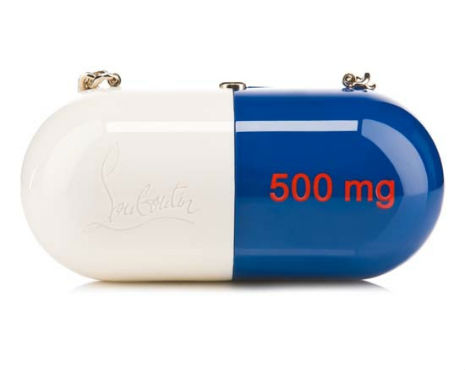
I can certainly appreciate the swell design of the “Pilule” bag by Christian Louboutin, however, I don’t like it enough to spend $6,995 on it. Yikes!
Christian Louboutin celebrates 20 years of iconic designs with a capsule collection compiled of favorite pieces from decades past. The “Pilule”, constructed in 100% resin, returns with the capsule collection. Produced in very limited quantities, this is your daily dose of Louboutin and it is just what the doctor ordered.
What pharmaceutical product is this capsule supposed to represent, anyways? I don’t recognize it. Is it a “happy” pill or just an antibiotic?
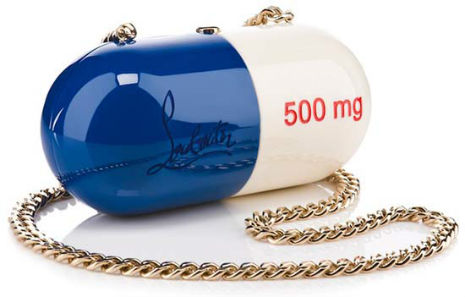

Via Who Killed Bambi
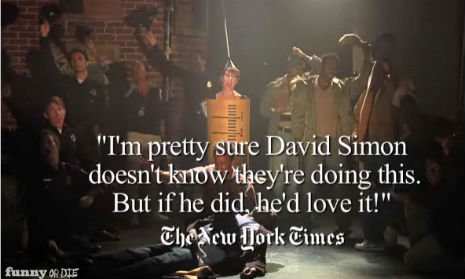
All you need to know is OMAR IS BACK!!!
I’m in! Now where do I buy tickets?
Previously on Dangerous Minds:
Characters from ‘The Wire’ made into little wind-up toys
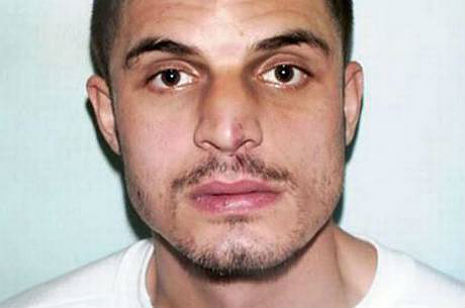
Reefer Madness—not so ridiculous after all?
Another month, another PCP face-eating incident – it’s difficult to imagine this particular drug ever wholly shedding its unfortunate association with spontaneous cannibalism.
All such occurrences recall to me a curious chat I once had with an engaging crank who claimed disembodied and malevolent spirits liked to haunt pubs and bars, as sufficiently inebriated souls (if sufficiently weak-minded) were easy to “hitch a ride with” – hence the middling mayhem that forever orbits serious boozing.
Accordingly, might we posit that PCP can open channels to some very unpleasant (not to mention peckish) entities indeed?
If you keep an eye out for these incidents, you might also observe that some of the other, generally better-regarded recreational drugs appear to induce comparable states of spiritual vulnerability. To my mind, one of the most illustrative (not to mention blackly comic) examples of this phenomenon took place in 2004, when the then 24-year-old Daniel Gonzales – aka “Zippy” aka “The Freddy Krueger Killer” and the “Mummy’s Boy Killer”– ended up going on a four day knife-wielding killing spree around Sussex and North London after a night’s raving – killing four and attacking two others.
An insight into the singularly bizarre turn of Zippy’s mind was provided when an old friend of his sold their correspondence (conducted after Zippy was convicted and locked up in a maximum security psychiatric institution) to an English tabloid. In this correspondence, Zippy comes across as a truly ungodly mixture of Ali G and Jack the Ripper. Generally buoyant – “Bruv, it’s Zippy, your favourite serial killer!” – but forever pining for his beloved Ketamine and Doomcore (a fast, particularly unpleasant form of techno), the least effort at introspection reduces Zippy to a state of bewildered incoherence.
“Did you read my story in da paper? Enuff of dat cos it’s doin my head in, I just wanted to be like the guy in Scream or Halloween nuffin wrong wiv dat iz there? Wouldn’t you wanna be like Mike Meyers? But it ain’t worth it. U ’ave to pay the price.”
Deep. But however hard our “favourite serial killer” on occasion tries to meditate upon his actions (“I done somefin sick + I can’t believe it”), Zippy’s thoughts tend more towards raving than redemption:
“I know you will still be partying when I get out so we can go to Amsterdam together and all that. I won’t be in here forever so not to worry – as long as you stay goin partys and snortin K.”
You’ve got to admire Zippy’s conviction that, in the extraordinarily unlikely eventuality of his release (Zippy’s judge recommended he be incarcerated indefinitely – and poor Zippy actually died in custody in 2007), his old pals would be so keen to pick up where they left off – skipping over to the ’dam to feast on psychedelics with a geriatric serial killer. Certainly Zippy’s “eccentricities” were generously tolerated prior to his arrest, as the following vignette (offered by Zippy’s correspondent in the accompanying tabloid interview) vividly demonstrates:
“Only a year before the murders we were round a friend’s house when Zippy pulled a map out of his pocket and unfolded it. He’d marked several churches in red ink and also named vicars serving at each. Someone asked what it was and he said he was studying it because he planned to kill all of the vicars in one, long rampage. Everyone just burst out laughing.”
A retrospectively sinister moment, you imagine! And one that arguably fits the hypothesis of possession – as might the following account of the killings themselves. Walk us through it, Zip, how did it all come to pass?
“Well I guess u wanna no wot happened! Remember that party wot we went to, it all happened after that party. I went out + killed 4 people cos I was so bored, basically I don’t know why I done it.”
So it would seem. At the time, the tabloids launched a half-baked witch hunt for Doomcore, but quickly lost interest after establishing that Zippy was one of about seven people who actually liked it. You’d think they’d have gone after recreational drugs (or even slasher films) instead. But, possession theory aside, I would recommend steering clear of anyone whose ideal night in consists of Doomcore, Freddy Kruger, and a gram of Ketamine. And whatever you do, don’t give them any PCP.